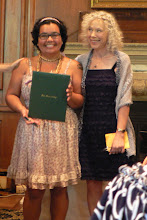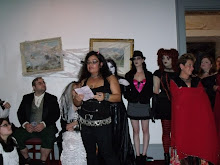one of my "crock-potted" history papers. i hadn't planned on sharing this but a newfound friend who read my minority opinion blog has begun discussing minority issues with me and i just sent this along to further our conversation and share a minority view of history. i read the same history books as everyone else, i come away with very different opinions and perspectives though, the kind that make professors squirm (especially white male ones. but this one, while not agreeing with my "harsh tone" and ultimate outcome, saw beyond the racial issues and said i presented my case well.) i don't have to be right. if you don't agree, tell me.
The Age of Upheaval
The fearsome power of wicked men fills the pages of history with tales of injustice. America during the 1950s and 1960s was full of treacherous acts by wicked men. Many of these men, themselves "leaders" and "upstanding citizens." After years of cruel and unfair treatment, minorities had enough. It was time for a great upheaval. It was time for change.
Long before the assassinations of great leaders, Martin Luther King Jr., Malcolm X, Medger Evers, John F. Kennedy, and Robert Kennedy, there were small yet pivotal acts of bravery and selflessness. Rosa Parks was a housekeeper, whose sore feet drove her to resist giving up her seat on a bus in December 1955. This woman set off an effective boycott of the busing system which ultimately led to the Supreme Court declaring segregated public transportation illegal. This is one of the many instances where the common hard-working people daily toiling under oppression led the "leaders" of this nation. In Little Rock, Arkansas, it was teenaged kids who led the way through the jeering crowds into southern school desegregation. An endeavor with political ramifications too great for the Supreme Court or Federal Government to get involved, instead they sent children. Dr. Martin Luther King, Jr., a Baptist minister whose Southern Christian Leadership Conference (SCLC), operated under theories of nonviolent resistance, were themselves met with savage cruelty (902). African Americans knew the rules. They could not be aggressors, they had to take the hits and suffer the traumas perpetrated on them or they and theirs would suffer consequences dire. White leaders, like Police Chairman Eugene "Bull" Connor, used "attack dogs, tear gas and electric cattle prods—even on some children in full view of the television cameras" (922). These arrogantly evil leaders seemed to parade their vicious acts of injustice, whereas African Americans had to be above reproach. Even then, they would most likely be assassinated.
Students united to "sit-in" at a segregated lunch-counter in Greensborough, North Carolina and the demonstrations spread throughout the South. These students formed a branch of the SCLC, called the Student Nonviolent Coordinating Committee (SNCC). Their aim was to "keep the spirit of resistance alive." What brave souls constituted these committees. "Freedom rides" conducted by an interracial group of students were met with "savage violence on the part of the whites" and forced JFK to "dispatch federal marshals to keep the peace and [order] desegregation of all bus and train stations" (922). What a battle had been won. The unspeakable bravery of those souls goes largely uncelebrated in popular culture, yet they are the ones who opened the door for our children and grandchildren. The Supreme Court, yea even the President were merely responding to the actions of these brave souls, as the leaders could not take the steps necessary to secure even the smallest gains for African Americans.
Brave souls constituted the whole of American servicemen who fought in Vietnam. While Bill Clinton and other sons of privilege took leave in some foreign land, hundreds of thousands of America's sons were fighting and dying in the quagmire of Vietnam. Johnson's questionable report of the attack in the "Gulf of Tonkin" secured a resolution for him to "take all necessary measures" to quell aggression. Johnson committed more than 100,000 American troops by March 1965, by "spring 1966 more than 4,000" soldiers had been killed and by the end of 1967 over 500,000 were fighting (934). The number of soldiers peaked at "more than 540,000" (960).
Sadly, "Larry Berman, writing in 1982" states, "neither Johnson nor his advisors were unaware of the obstacles to success in Vietnam." He "committed troops…because he feared that allowing Vietnam to fall would ruin him politically and destroy his hopes for building his 'Great Society'" (937). In 1971, the American military was decaying and the morale and discipline of troops deteriorating (961). Problems of “desertion, drug addiction, racial bias, refusal to obey orders, and killing unpopular officers by enlisted men" were tragically common. Like the proverbial ostrich with its head underground, Nixon was convinced "a defeat in Vietnam would cause unacceptable damage to the nation's (and his own) credibility" (962). What a sad end to a terrible war, in spring, 1975 Americans evacuated Saigon as "desperate South Vietnamese and officials fought with American soldiers and diplomats for space on the few airplanes and helicopters available" (964). The Pentagon Papers, leaked to the press in 1971 by former Defense Department official Daniel Ellsberg, "confirmed what many had long believed: the government had been dishonest, both in reporting military progress of the war and in explaining it's own motives for American involvement” (961). The savagery of American "leaders" extends then not only to minorities, but to the very men and women who constitute the armed services. America would ultimately lose over 57,000 sons, with an additional 300,000 injured (964). Was the carnage solely to further Johnson and Nixon’s political aspirations? Can men be so heartless? I shudder to imagine the depths of evil in the hearts of our "leaders."
Johnson's Great Society programs could scarcely be considered products from the heart of an evil man. However, much legislation credited to Johnson, was birthed in the Kennedy years. "The ambitious measure that Kennedy had proposed [namely, a comprehensive civil rights bill] in June 1963" passed in early 1964, "impetus" gained from the Kennedy assassination (923). "The war on poverty was one that Kennedy had been planning…in the last months of his life" and "Johnson launched only weeks after taking office." From the war on poverty arose Medicare, open to all elderly in the nation and Medicaid open to the impoverished and indigent. Many minority leaders got their start in Community Action programs devised by the Office of Economic Opportunity (OEO). It was unable to sustain financially, but proved a useful vehicle for empowering minorities (919). "Kennedy had long fought for federal aid to public education" but could not overcome a few obstacles. Johnson devised a plan where aid was based on student need versus school need. The Elementary and Secondary Education Act of 1965 passed. The successes of Johnson's Great Society were reduction of hunger, passage of much needed aid, and "contributed to the greatest reduction of poverty in American history." However the Great Society failed because it proved too expensive to support, there was no reliable means of funding, and failing programs led to disillusionment with government's "ability to solve social problems." While number crunchers offer a titillating shift in those living below the poverty level, upon examination the shocking truth of the disparity of human life in America is revealed. In 1959 the national average of those below the poverty line was 21%, by 1969 that number had dropped to 12%. Sure it looks good at first, but when broken down by race, the numbers are appalling. In 1959 a whopping 56% of African Americans were below the poverty line, and in 1969, 32%. In stark contrast, 18% of whites were below the poverty line in 1959, and in 1969 only 10% (921). These numbers clearly demonstrate the great failure of this nation to empower the hard-pressed. The Great Society was a failure. If more than half-white Americans were impoverished, immediate action would be taken. Yet almost one third of African Americans remained impoverished and these numbers are celebrated as some great success. It is just another example of the many great injustices of this nation where all men are "created equal."
Men can struggle under injustice for only so long. Minorities, youths, artists, and students reacted strongly against the blatant injustices in America. Students for a Democratic Society (SDS) declared themselves in the Port Huron Statement (946). They were disillusioned with the society they had inherited and were determined to revolutionize politics. Free Speech was a premiere issue where students were seeking to be heard. The antiwar movement was quite volatile, and with good reason. Men were dying in Vietnam and there seemed no end to the bloodshed and perhaps worse, no understanding of the reasons for the war. The radical "Weathermen" were responsible for arson and bombings, which claimed several lives. The draft was a sore spot for many students. The SDS succeeded in pushing antiwar protest to center stage. "Abolition of many traditional deferments-for graduate students, teachers, husbands, and fathers" must have made the student's feel as if their lives were expendable (947). And indeed, to the administration they were. Just as Saigon fell, so too did Nixon.
In 1973, newly re-elected President Nixon's façade began to crack. Nixon's conservative silent majority was a winning election ploy, but proved to be as empty and meaningless as his administration. In June 1972 men were arrested for breaking into the Watergate office building in Washington, D.C. Washington Post reporters discovered among them past employees of the Committee for the Re-Election of the President. When put on trial, John Dean, former counsel to the President, accused Nixon of involvement in the scandal. When word of tapes arose, Nixon fought to suppress them under executive privilege, and was denied by the Supreme Court in United States v Richard M. Nixon (1974). The House later recommended "three articles of impeachment" (975). Stanley I. Kutler writes "Nixon's life long resort to vicious political tactics" and "longstanding belief that he was the special target of unscrupulous enemies" led to paranoia. Nixon was convinced he had to "get them before they got him" (977). On August 8, 1974, Nixon resigned. "Many Americans expressed relief and exhilaration that, as the new President [Ford] put it, 'our long national nightmare is over'" (978).
Whether it be called a nightmare or acid trip, the Counterculture movement was feeling free. These longhaired, rock and roll loving, concert attending, free loving, junkies were the new America. LSD was the ticket to ride, and hedonism reigned supreme (949). The Beatles, tame—even happy by modern day standards—were outlandish to the mainstream. Eastern religions were part of the rejection of all things American. Musicians, such as Bob Dylan and Joan Baez set the radical tone of the age (950). Poets, like Alan Ginsberg proclaimed a "new consciousness" and declared Woodstock as "a new kind of bliss." (It was only a concert Alan, come on.) Movies and television began slanting away from the conservative fare of older days, to portrayals of new sexual mores, political issues, violence and social conflict (951). Perhaps no where is the counterculture struggle more accurately portrayed than in the events transpiring with Native Americans. "In 1961 more than 400 members of 67 tribes gathered in Chicago to discuss ways of bringing all Indians together…to redress common wrongs." The issued a manifesto called "The Declaration of Indian Purpose" which "stressed 'the right to choose our own way of life' and 'the responsibility of preserving our precious heritage.'" It was about time. In 1968, American Indians banded together in militant form creating the American Indian Movement (AIM). These activists saw the passage of the Indian Civil Rights Act, "which guaranteed reservation Indians many of the protections in the Bill of Rights." In 1969, AIM occupied Alcatraz Island in San Francisco Bay, "by right of discovery" (953). In 1973, AIM staged a long overdue revolt at the site of the 1890 massacre at Wounded Knee. The effort to force "the government to honor its long-forgotten treaty obligations" ended with "one Indian dead and another wounded" (954). Others in the fight for liberation were Latinos, Women, Gays and Lesbians. It was a time of great social outcry and steps in the direction of reform.
Reform comes slowly and at great cost, in lives and sacrifice. It is with great appreciation to those who have gone before, that I enjoy the company and friendship of my African American friends. It is with great gratitude my family enjoys the freedom to celebrate our heritage. Great breaches of trust transpired in the early years of America. Yet we stand poised to address our errors and push forward into a new day. This president, George W. Bush, seems equal to the task of leading our country into a time of humanity and graciousness. There are still inequalities and injustices, but those will be overcome by the continuing sacrifices of the brave. I hope and pray evil will not rule America. We have seen only glimpses of the havoc it can wreak in society. I pray we someday have a better sense of purpose and unity as a nation. Unity does not come by denying past wrongs, but acknowledging them and demonstrating a sincerity and commitment to further equality. Something I have not yet seen in America.
Works Cited
Brinkeley, Alan. “The Unfinished Nation: Volume II, From 1865, Third Edition.” McGraw-Hill Companies, Inc. Boston, 2000.
Tuesday, July 06, 2004
Subscribe to:
Post Comments (Atom)
















No comments:
Post a Comment